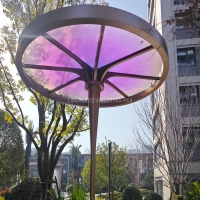Welcome to the website for landscape facilities products and knowledge.
How does the table’s surface handle exposure to saltwater or pool chemicals?
When investing in outdoor furniture, particularly for coastal areas or poolside settings, understanding how table surfaces endure exposure to saltwater and pool chemicals becomes crucial for long-term satisfaction. High-quality outdoor tables typically employ specialized materials and protective finishes specifically engineered to combat these corrosive elements.
Aluminum tables, especially those crafted from marine-grade aluminum, offer exceptional saltwater resistance through their natural oxide layer that prevents rust formation. This protective barrier becomes particularly effective when enhanced with powder coatings, creating an additional shield against both salt corrosion and chemical degradation. The powder coating process involves electrostatically applying dry powder to the metal surface followed by heat curing, resulting in a durable, uniform protective layer that withstands harsh environmental conditions.
For teak wood tables, their natural oils provide inherent resistance to moisture and chemical damage. These oils act as a built-in protection system, preventing salt crystals from penetrating the wood grain and minimizing damage from chlorinated water. Regular maintenance, including occasional cleaning with mild soap and water, helps preserve these natural defenses while preventing chemical buildup.
Polywood and synthetic wicker tables present another excellent solution for challenging environments. Manufactured from recycled plastics with UV-inhibiting pigments, these materials completely resist saltwater corrosion and remain unaffected by pool chemicals. Their non-porous surfaces prevent moisture absorption and make cleaning simple – typically requiring just a rinse with fresh water.
Glass table surfaces, particularly tempered glass, demonstrate remarkable chemical resistance but require careful attention to their underlying frames. While the glass itself remains impervious to salt and chemical damage, the supporting structure must feature adequate protection to prevent deterioration.
Protective measures significantly extend table longevity in harsh conditions. Applying specialized sealants to wooden surfaces creates an impenetrable barrier, while routine cleaning with fresh water after saltwater exposure prevents corrosive buildup. For poolside tables, promptly wiping chemical spills and using protective covers during winter months or extreme weather further preserves surface integrity.
Manufacturers continue advancing protective technologies, developing increasingly sophisticated coatings that resist fading, chipping, and chemical degradation. When selecting outdoor tables for saltwater or poolside environments, prioritizing materials with proven corrosion resistance and proper protective finishes ensures your investment withstands environmental challenges while maintaining aesthetic appeal.
Related search:

Recommendation
Metal frame with gradient color acrylic combined with high-end shading landscape facilities